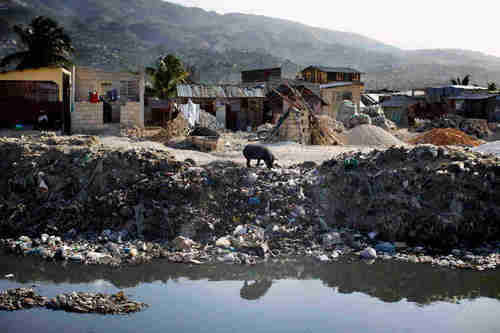This morning’s key headlines from GenerationalDynamics.com
- The last UN peacekeepers leave Haiti after 14 years
- Thousands of Haitians living in Miami scheduled for deportation in January
The last UN peacekeepers leave Haiti after 14 years

People dump trash and raw sewage into canals that run through Port-au-Prince, Haiti. When it rains, the canals overflow and flood poor neighborhoods. (NPR)
Haiti often appears to be a cursed nation. One of the poorest nations in the world, it has suffered one calamity after another.
The United Nations Stabilization Mission in Haiti (MINUSTAH) was established in 2004 after armed conflicts that had spread across the country. Then, on January 12, 2010, the earthquake struck, killing 316,000 people and leaving more than 1.5 million people homeless, and 3.3 million facing food shortages. More UN peacekeepers were sent in the aftermath, including some of Nepal that infected the water with cholera. Haiti had previously been free of cholera, but now cholera is endemic.
There have been numerous attempts to help the Haitian people, including a Haiti Fund sponsored by former presidents Bill Clinton and George W Bush. The fund received some $54 million in donations, which was donated to small businesses in the form of grants and loans, with an emphasis on fish farming, architecture and nursing. All the money was spent in about 18 months. According to the fund spokesman, by the time the fund had closed down, it had directly created or sustained 7,350 jobs and affected more than 311,000 people in Haiti.
Now that the peacekeeping mission is being closed down after nearly 15 years, the descriptions of its accomplishments are only lukewarm. Sandra Honoré, the head of the peacekeeping force, says that Haiti has made significant progress since U.N. forces arrived in 2004 amid massive street protests and a bloody rebellion that toppled democratically elected President Jean-Bertrand Aristide:
The Haitian people enjoy a considerable degree of security and greater stability. Political violence has diminished considerably. Armed gangs no longer hold the population hostage. All three branches of power are in place with the executive and legislative branches restored to full functioning.
However, [immediate improvements] have yet to be felt by the vast majority of the population, particularly in poor urban areas.
So with that relatively unenthusiastic endorsement, the stabilization effort is ending on Sunday, when the last peacekeepers will be withdrawn.
The final report on the effort, delivered to the UN Security Council, listed several achievements, but warned of some potential problems, eight months after Jovenel Moïse took office as president.
One issue is that elections to establish councils and assemblies at the municipal levels have been stalled. As regular readers are aware, this is a story that I’ve seen over and over, in country after country in a generational Awakening era, following a civil war. A political leader, usually on the winning side of the war, takes power and refuses to give it up, often using brutal tactics, including torture, jailings, and rapes to suppress the opposition. This kind of brutal tactic has not occurred in Haiti, but Haiti has a history of such tactics, and the peacekeepers haven’t left yet. It remains to be seen whether and when these elections will be held.
A second issue is that Moïse is building an army of 3,000 soldiers, to fill the security vacuum left by the departing peacekeepers, and he is taking direct control of the recruitment. Haiti has a history of the prime minister or president of using the army as a weapon against the opposition, in order to remain in power.
There is already a Haitian National Police which now has about 15,000 trained members, which was set up by the departing peacekeepers. But apparently, Moïse would rather build his own army, with his own people in charge and under his complete control. Miami Herald and United Nations and Public Radio International and ReliefWeb and BBC (11-Jul)
Thousands of Haitians living in Miami scheduled for deportation in January
Some 24,000 Haitians arrived in the United States following the January 2010 Haiti earthquake, and they were given “Temporary Protected Status” (TPS) by the Obama administration, allowing them to stay in the country and work, and send remittances back to their families in Haiti.
The TPS for Haiti was meant to last only 18 months, but it kept getting 18-month extensions under the Obama administration. When the last TPS extension expired in May, the DHS announced a final six-month extension. In a statement from DHS:
The Department of Homeland Security urges Haitian TPS recipients who do not have another immigration status to use the time before Jan. 22, 2018, to prepare for and arrange their departure from the United States.
According to immigration rights activist Marleine Bastien:
Thousands of Haitian TPS recipients have been living in the U.S. for an average of seven to 25 years. To deport them and force them to leave behind their U.S.-born children will be a catastrophe of great magnitude.
Bastien says that if Haitians are deported back to Haiti, they will be facing famine and poverty. Many will go underground to avoid being deported.
Bastien is demanding that the TPS benefit be extended not just for another 18 months, but forever, or until a way is found to get Haitians off TPS, and grant them legal residency. Miami New Times and Miami Herald
Related Articles
- US will deport tens of thousands of Haitian immigrants surging toward California (25-Sep-2016)
- Canada receives record numbers of Mexican asylum seekers after Trudeau’s welcome tweet (13-May-2017)
- Thousands of migrants flee to Canada, fearing deportation in the US (04-Aug-2017)
- Violence and cholera spread in Haiti (09-Dec-2010)
- History of Haiti (04-Mar-2004)
KEYS: Generational Dynamics, Haiti, Bill Clinton, George W Bush, United Nations Stabilization Mission in Haiti, MINUSTAH, Sandra Honoré, Jean-Bertrand Aristide, Jovenel Moïse, Temporary Protected Status, TPS, Marleine Bastien
Permanent web link to this article
Receive daily World View columns by e-mail

COMMENTS
Please let us know if you're having issues with commenting.